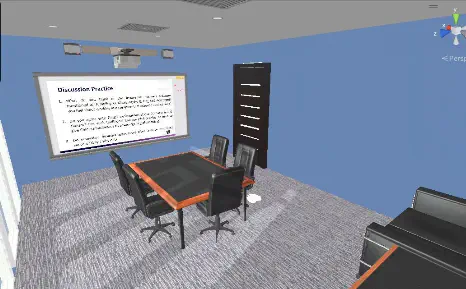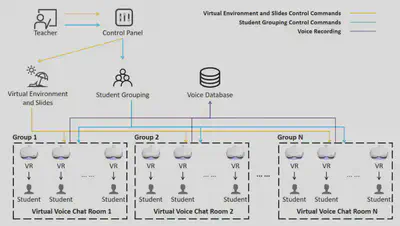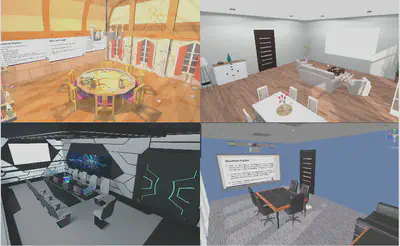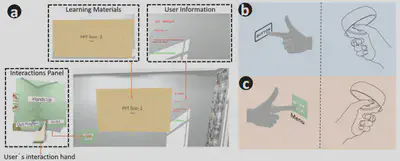The Impact of VR Interactive Scenarios on Language Learning

The Impact of VR Interactive Scenarios on Language Learning
Project Overview
In collaboration with the XJTLU X-CHI Lab and XJTLU Language Center, from May 2022 to January 2023, I contributed to a pioneering study titled “The Impact of VR Interactive Scenarios on Language Learning.” The project aimed to explore the effectiveness of virtual reality (VR) in enhancing the language learning process through interactive scenarios.
Introduction
As an emerging pedagogical tool, Virtual Reality (VR) has captured the interest of educators and learners alike, particularly in the field of English language learning (ELL). My project investigates university English language learners’ attitudes towards using VR environments for practicing oral English through group discussions. It delves into how their preconceptions about English for Academic Purposes (EAP) influence their receptiveness to VR learning.
The evolution of VR technology over the past two decades, coupled with its increasing affordability, has opened new doors for educational applications. My research explores these avenues, particularly the impact of VR on second language acquisition, an area ripe for discovery due to the technology’s immersive and interactive capabilities.
Project Contributions
- Unity Scene Development: Constructed various Unity scenes including classrooms, apartments, conference rooms, and other interactive settings to simulate real-life language learning environments.
- Network Communication: Utilized Python and JavaScript to build robust network communication, enabling multi-device access and facilitating multiplayer interactive sessions.
- VR Deployment: Packaged and deployed the educational software onto Oculus Quest 2 for in-class experiments spanning half a semester.
- Data Analysis and Model Training: Applied Python for semantic recognition and neural networks to analyze experimental data, training models to derive insightful research conclusions.
Research and Development
The project’s core involved the development of an online English-learning platform that:
- Allows real-time audio communication for users in disparate locations.
- Utilizes advanced VR technology to create immersive, interactive group learning experiences.
- Enables dynamic grouping and distribution of learning materials through a controlled environment.
Methodology
Step 1: Building the System
Our VR English Group Learning System integrates three core components:
- Voice Communication System: Using Agora’s voice SDK for real-time, multi-channel audio services.
- User Information Track System: A database captures student information, allowing dynamic grouping and teacher modifications.
- Virtual Environment Control System: Enables material broadcasting and environment manipulation by the teacher through a control panel.
Step 2: User Study
Our study utilized two platforms over a semester:
- Traditional Platform: Similar to Zoom for conventional group discussions.
- VR Platform: Developed in-house for immersive learning experiences.
Participants also engaged in a Focus Group Interview to provide qualitative insights.

Experiment Insights
Through the deployment of VR in group discussions and interactions, we observed:
- Increased student engagement and improved language acquisition.
- The potential of VR to overcome the challenges of traditional classroom settings, especially during restrictive scenarios like the pandemic.
We meticulously analyzed questionnaires, interview recordings, and group discussions, leading to several findings:
- VR Group Discussions Enhance Motivation: Participants found VR to be a novel and engaging method for language learning.
- VR Assists in Overcoming Shyness: The VR platform provided a comfortable space for students to communicate without the pressure of being on camera.
- Presence and Immersion: Students reported a genuine sense of being in a different, realistic space.

Future Directions
The study offers a framework for developing massive online multiplayer virtual classrooms and identifies potential technical hurdles in creating such platforms. We aim to further enhance interactivity and immersion, extending beyond audio communication to provide a more holistic and interactive learning experience.